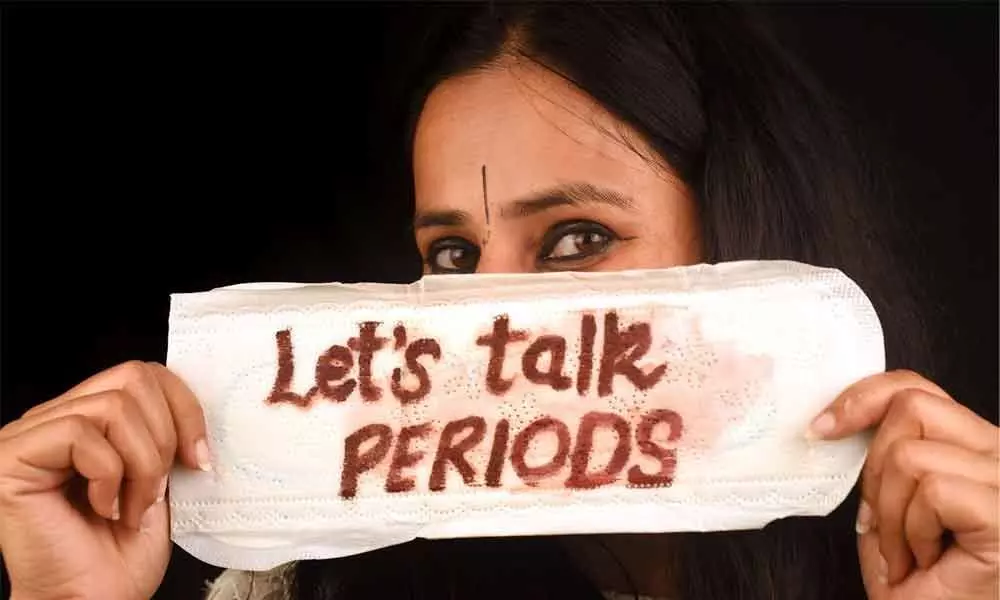Live
- Holi Festival: Liquor Outlets to Remain Closed for Holi in Hyderabad
- iQoo launches Neo 10R model
- Hyderabad: Woman Alleges Caste-Based Harassment by Roommates in Shaikpet
- Markets end on flat note
- Nifty Metal index falls after US tariffs
- AP minister clarifies on TIDCO houses, says all the issues will be addressed
- Uppal Stadium Preps for IPL with Rs 5 Crore Renovation
- Sebi speeds up rights issue process
- Ladhani Group to invest Rs 11K cr over 5 yrs
- Moody’s forecasts higher GDP growth in FY26
Menstrual hygiene – a challenging development issue


Menstruation is being perceived as unclean or embarrassing thing, extending even to the mention of menstruation both in public and in private. Most girls even hide themselves out of fear or embarrassment on their way to a medical store, rather majority of them cannot afford to buy hygienic sanitary pads
A woman's menstrual health is crucial to her well-being, and also to the well-being of her family and community.
But too often — especially in the developing world — mind-sets, customs and institutional biases prevent women from getting the menstrual health care they need to thrive.
Menstrual hygiene continues to be amongst the most challenging development issues today.
Menstruation is associated with the onset of puberty in girls and many a times, it brings with it rules, restrictions, isolation, and changed expectations from the girls by the society.
This changed attitude towards girls such as restrictions on their self-expressions, schooling, mobility and freedom has far reaching consequences on the mind-set of women.
Menstruation is still considered a taboo subject in the Indian society. Even today, the cultural and social influences on the people create a major hurdle in ensuring that the adolescent girls are given proper knowledge on menstrual hygiene.
The mothers are reluctant to talk about this topic to their daughters, and many of them lack scientific knowledge on puberty and menstruation.
The main reasons for this taboo still relevant in the Indian Society is high rate of illiteracy rate especially in girls, poverty and lack of awareness about menstrual health and hygiene. Only less than 18% of Indian women use sanitary pads.
The latest National Family and Health Survey found that 58 per cent of young Indian women (15-24 years) use a hygienic method of protection (mostly sanitary pads), a significant increase from the 12 per cent using pads in 2010.
This is, no doubt, a consequence of greater attention to menstrual hygiene management over the past few years in India. This is not only prevailed in Indian society but a global issue that many other countries are facing.
On a global level, at least 500 million women and girls globally lack adequate facilities for menstrual hygiene management.
Lack of adequate information on sanitation and hygiene facilities, particularly in public places, such as in schools, workplaces or health centers, can pose a major obstacle to women and girls.
Even today in many families freedom of women continues to be in the hands of patriarchal discourse. With the evolution of these cultures, there has not been any significant change in people's attitudes and mentality towards menstruation.
In some families, menstruation is being perceived as unclean or embarrassing thing, extending even to the mention of menstruation both in public and in private.
Most girls even hide themselves out of fear or embarrassment on their way to a medical store, rather majority of them cannot afford to buy hygienic sanitary pads.
Large numbers of girls in many less economically stable families drop out of school when they begin menstruating. More than 77% of menstruating girls and women in India use an old cloth, which is often reused, ashes, newspapers, dried leaves and husk sand to aid absorption.
During their menstruating days, women are prohibited from participating in normal life. They are not allowed to enter the house during these days.
A woman must be "purified" before she is allowed to return to her family, forbidden from performing any rituals. She is prohibited to enter the kitchen or a temple on any given day, anything she touches will not "go bad" or rot.
But the truth is that a menstruating woman is going through a natural and healthy biological process.
On menstrual hygiene mission, Niraj Gera a renowned photographer has gone to interior villages of the country and has done an exclusive photo series "Sacred Stains" Which powerfully express the problem faced by women in her daily life and urge viewers to become more sensitive towards underprivileged women and their traumatic circumstances.
To continue this campaign through his NGO Humanify Foundation he recently started a nationwide campaign PAAVNI to aware women as well as men of the society about menstrual health and hygiene.
It also provides information to dispel myths and taboos surrounding this issue
Project 'Paavni'is a unique campaign aimed at enabling women in the society to become change agents. The vision of the project is to empower girls, women & men with knowledge and awareness on menstrual health and hygiene & giving them free sanitary pads under the umbrella of Water, Sanitation and Hygiene campaign (WASH).
It also aimed at Gender Sensitisation (Gender Equality of Opportunity) and raising the awareness for the proper sanitation & toilets in India, which is the need of the hour.
The objective of this holistic sensitisation program will be accomplished through integrated awareness, motivation & meditation programs and by providing know-how on how to handle menstruation, improve girls' knowledge of personal hygiene and boost their confidence by answering their unanswered questions through interactive and engaging training methods during theirpan India trip.

© 2025 Hyderabad Media House Limited/The Hans India. All rights reserved. Powered by hocalwire.com






